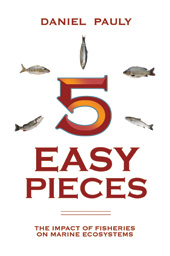
 Daniel Pauly’s research over the last 20 has provided much of the foundational theory in modern fisheries management. In 5 Easy Pieces, Daniel Pauly presents his five most influential papers, with a concise history of both the intellectual and human motivations that led to each study. The papers that were included in this volume are: Primary Production required to Sustain Global Fisheries, Fishing Down Marine Food Webs, Systematic Distortion in World Fisheries Catch Trends, Towards Sustainability in Global Fisheries, and The Future of Fisheries.
Daniel Pauly’s research over the last 20 has provided much of the foundational theory in modern fisheries management. In 5 Easy Pieces, Daniel Pauly presents his five most influential papers, with a concise history of both the intellectual and human motivations that led to each study. The papers that were included in this volume are: Primary Production required to Sustain Global Fisheries, Fishing Down Marine Food Webs, Systematic Distortion in World Fisheries Catch Trends, Towards Sustainability in Global Fisheries, and The Future of Fisheries.
 Students of marine conservation should already be familiar with most of this book’s content. If you haven’t read any of Pauly’s work before, or are just starting out in marine science, this book is an excellent and essential addition to your collection. If you’re familiar with his work, and have read these five papers (and responses and critiques), you won’t find much new in this volume. The back stories are interesting, but the real meat is in the papers themselves.
Students of marine conservation should already be familiar with most of this book’s content. If you haven’t read any of Pauly’s work before, or are just starting out in marine science, this book is an excellent and essential addition to your collection. If you’re familiar with his work, and have read these five papers (and responses and critiques), you won’t find much new in this volume. The back stories are interesting, but the real meat is in the papers themselves.
These are important papers, and having all five of them together, complete with responses, new reports, critiques, and the lead author’s personal exposition, is a useful addition to the library of any student of marine conservation. I enjoyed reading about the people behind the paper, how different groups responded to their publication, and what effects these papers had on both fisheries management and scientific progress. Pauly provides enough background to allow a non-specialist audience to read and understand the technical details of each paper, and takes his time carefully and clearly expanding upon the issues each paper raises. The chapter on sustainability is especially pithy. The final chapter on the future of fisheries is simultaneously disheartening and hopefully, the kind of message you should expect from an honest assessment of the ocean.
I try not to delve too much into design and layout when talking about books, but 5 Easy Pieces is a unique format for a popular science book, and the design requires some critique. Using full text peer-reviewed publications as the foundation of each chapter is an interesting idea, and one not without merit, but it was not well implemented. I found the transitions from the authors prose to the papers jarring, which wasn’t helped by the heavy shadowboxes meant to delineate previously published works from original content. For small extracts, I could see that working, but when the quoted text takes up the bulk of space, the shadowboxes become far too distracting. Likewise, the occasional shift from single into double column seriously interrupts the flow of what was otherwise very readable prose. This book could have benefited from more attention to detail in the design (there’s even an iStockphoto watermark on the cover).
If your new to marine conservation, aren’t familiar with these five papers, or are interested in the nuts and bolts that go into these kinds of studies, pick up a copy of 5 Easy Pieces. If you’re already following Pauly’s work and read these papers when they appeared in Science and Nature, you can probably give this book a pass.
Sounds like a good recommendation. Just got one ordered up. Amazon has em. I also got and am looking forward to “An Unnatural History of the Sea” by Dr Robert Callum. And one of my own recommnedations. “Sea Change” and “Wild Ocean” by Dr. Sylvia Earle